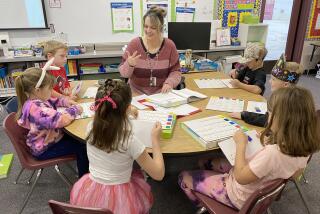‘Learning’ Explores Education Strategies
- Share via
One source of the considerable power of “Early Learning,” John Merrow’s documentary looking at four divergent approaches to educating children more effectively in their first few school years, is what it does not do.
It does not attack schools or teachers or teacher unions. It does not argue that vouchers would force public schools to get better. It does not simply demand more spending or better computers. It does not allow its subjects to use educational jargon to obfuscate. And, for the most part, it does not portray statistics that are open to interpretation as solid evidence.
Rather, the hourlong piece by Merrow, a former education correspondent for the “MacNeil/Lehrer NewsHour” who now hosts quarterly education documentaries for PBS, provides remarkably clear and compelling synopses of the four strategies, stressing what sets them apart. And it sticks close to its central theme--that schools and children alike can achieve far more than they do now, if we ask them to.
In the two most effective segments, Merrow employs a journalistic technique that is as canny as it is brutally frank. Early in the school year, we see the children as they struggle to read and giggle when asked to demonstrate their (lack of) knowledge of simple arithmetic. Then, Merrow returns periodically to see how much they’ve learned.
The progress the students make in arithmetic is profound, with several of them exuding hard-won confidence in their abilities. The reading picture is downright disturbing. One class of students, whose whole language instruction is supplemented with phonics, can read at the end of the year. Another, whose teacher avoids phonics, cannot.
*
Perhaps the most provocative of the four approaches is that designed by culture maven E.D. Hirsch Jr., a University of Virginia professor who became famous a decade ago for the idea of “cultural literacy.”
Hirsch believes in teaching all children a core of knowledge about history, geography, science, math and other subjects. And the children depicted here delight in speaking authoritatively about such things as the solar system, ancient Egypt or electricity. Any parent would be moved to see such sophistication in ones so young.
The bottom line, Merrow asserts, is that we know how to teach children more than they are learning now. The reason we don’t, he concludes, is that we lack confidence in their abilities.
“Deep down, we believe that only some children are smart and only some children can learn,” says Lauren Resnick, University of Pittsburgh education researcher, near the end of this piece. If that’s true, then the impact of all educational reform, including the ones featured here, will be minimal.
* “The Merrow Report: Early Learning” airs at 10 tonight on KCET-TV Channel 28.






